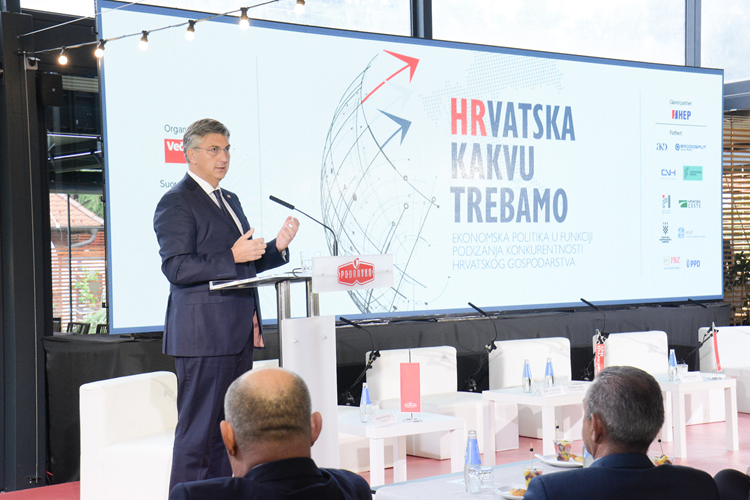- Published: 20.09.2021.
Croatia quickly back on road to economic recovery
Prime Minister Andrej Plenković said on Monday that Croatia had returned quickly to the road of economic recovery after the coronavirus crisis, and that with a €25 billion financial injection from Europe, the current decade could be referred to as a development decade in the full sense of the word.
Plenković made this statement while opening a conference organised by the Večernji List daily and the Podravka food manufacturer, called "The Croatia we need - Economic policies aimed at improving the competitiveness of Croatia's economy."
He underscored that the coronavirus pandemic had led to the greatest health and economic crisis since World War II and that due to unexpected costs and reduced income, it had cost Croatia HRK 35 billion.
Plenković said that the government had justified its role during the crisis and backed the private sector, preserving its liquidity and jobs.
He said that Croatia had had a very good reputation given its achievements prior to the coronavirus crisis, underlining as crucial during the crisis the fact that the country had retained the trust of international financial institutions, financial markets and credit rating agencies. That trust, along with political stability, has created the framework for us to be where we are today, he said.
Plenković said that Croatia had quickly returned to the path of economic recovery and that he was optimistic about GDP growth in 2021. He recalled that previously economic growth had been forecast at about five per cent whereas now Croatia's economy was expected to grow by up to seven per cent.
He highlighted increased investments as well as preconditions that were created for the tourism industry to achieve results above all expectations, with 12 million tourist arrivals since the start of the year and more than 75 million bed nights, an increase of 67% and 77% respectively compared to 2019.
Also, according to data from the Croatian Pension Insurance Fund (HZMO) and its employment indicators, at the end of July Croatia had more than 1.6 million beneficiaries, which is the most in the past 13 years.
The PM underscored that already in the first year of the second term of his government 50,000 new jobs were created, which is half of the 100,000 jobs the government had promised to help create by the end of its term. The unemployment rate is 7.4% while the employment rate is 66.9%. The average pay in June amounted to HRK 7,175, and the aim is for it to reach (the equivalent) of €1,000 by 2023, which should coincide with Croatia's accession to the euro area, he said.
Plenković recalled that Croatia would soon receive €820 million as part of the National Recovery and Resilience Plan and with that amount taken into account, Croatia would find itself about HRK 50 billion better off in comparison to how much it had paid into the European budget.
He said that Croatia's prospects would be impacted by increasingly extreme climate conditions resulting in higher prices of food and energy and that it was necessary to respond to those challenges at the national and global level.
One way is to step up the green and digital transformation of the economy with the use of generous European funds. In the context of growing prices of energy products, the LNG terminal on the island of Krk is an essential element for Croatia's consumers and industry, said Plenković.
Text: Hina
